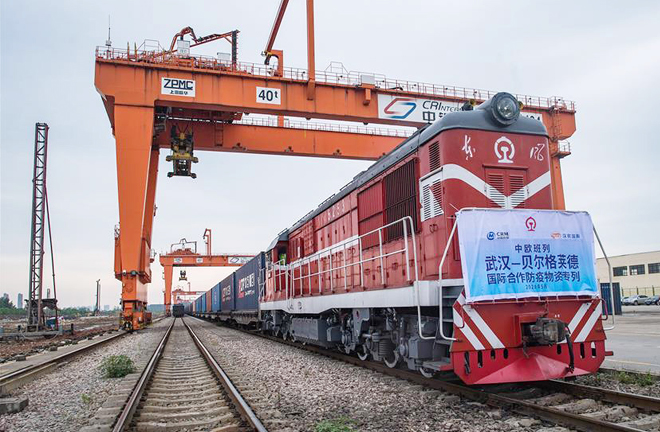CASS releases report on international situation

A China-Europe freight train carrying anti-epidemic supplies leaves Wuhan, Hubei Province, for Belgrade, the capital of Serbia, on May 9. Photo: Xiao Yijiu/XINHUA
With a global economic slowdown and intensified competition among major countries in 2019, the stability of international security strategies has declined, according to a report on the international situation by the Chinese Academy of Social Sciences (CASS) released at a webinar in mid-May.
In 2019, the growth rate of the world economy declined, international trade shrank and the risks inherent in the world economy rose, according to the report. The year witnessed pronounced competition among major countries in international politics and a decreasing number of global armed conflicts, but regional wars have continued and the stability of international security strategies has declined.
In 2020, the global situation and world pattern will show eight major trends, the report concluded. The global economy will enter an era of ultra-low interest rates, and the game of strategic interests in global governance will be increasingly fierce. Regional and bilateral cooperation will advance rapidly, but the rift between East and West in international strategy and security will widen. This year will also witness more prominent wrestling in cyberspace, fiercer competition in science and technology, a rising risk of nuclear proliferation, and more internationalized extremist behavior.
Xie Fuzhan, CASS president and editor-in-chief of the report, pointed out in his keynote speech that the COVID-19 pandemic is now the most uncertain factor in analyzing and judging the international situation. The pandemic has already exerted a profound impact on the international economy, politics and security, bringing severe challenges to international cooperation. Fueled by the pandemic, various risks in the world economy have continued to accumulate and be exposed. The capital market is turbulent, crude oil prices have fallen sharply, and the world economy has contracted significantly.
The relations among major countries in international politics are facing new factors of instability, Xie continued. In order to pass off responsibility for poor epidemic prevention and control and to safeguard the political interests of certain individuals or groups, politicians in some countries have created stigma and politicized the fight against the COVID-19 pandemic, making remarks that violate generally accepted moral standards and basic scientific common sense. They have created lies, panic, discrimination and prejudice, thus casting a new shadow on the stable development of international relations. The geopolitical pattern has accelerated in its evolution, and the international political system has been deeply transformed. As such, traditional and non-traditional security threats are intertwined, and national security faces unprecedented challenges.
It is imperative to strengthen global cooperation and macroeconomic policy coordination to fight the virus, Xie said. Many places around the world have seen the rapid spread of the virus, which has posed a huge threat to people’s lives and health, with serious impacts on global personnel exchanges and the world economy. COVID-19 is the enemy of all, and should not be used to make an enemy or create hostile relations.
At present, the spread of the pandemic has not been effectively contained. The risk of imported cases from overseas is still rising in various countries. There is still great uncertainty as to the trajectory of the pandemic and its impact on the economy and society. The importance and urgency of international cooperation and coordination have increased significantly, Xie said.
As epidemic prevention and control becomes a new normal, countries cannot defeat it without sincere, sustained and effective cooperation. “Only by strengthening international macroeconomic policy coordination can we minimize the pandemic’s impact on the economy and society,” Xie noted.
COVID-19’s sudden outbreak has interfered greatly in Belt and Road (B&R) construction, Xie mentioned. Despite this, B&R international cooperation still shows strong resilience, and China’s trade and investment with the countries and regions along the route have grown despite the pandemic.
The pandemic has also brought opportunities for the high-quality development of the B&R, Xie said. For one thing, the pandemic provides an opportunity for the high-quality advancement of the Health Silk Road. For another, the pandemic provides new space for the high-quality advancement of the Innovation Silk Road. The pandemic has had a heavy impact on traditional industries, but it has also accelerated the application of new technologies, such as online technology, 5G, artificial intelligence and big data, creating opportunities for innovative emerging industries to expand to countries and regions along the B&R.
edited by JIANG HONG
